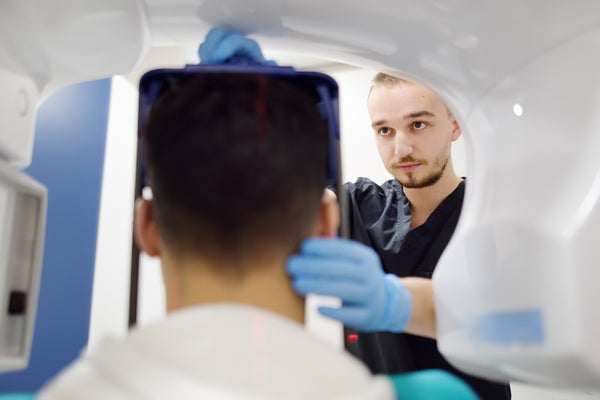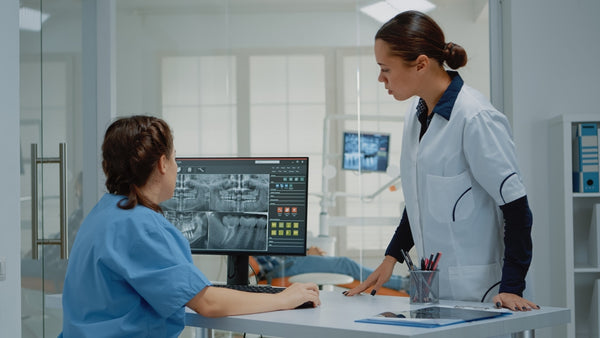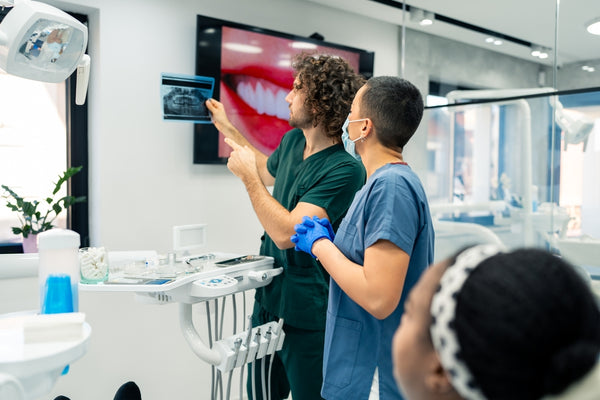
The Role of Dental Assistants: Key Responsibilities & Skills
Behind every successful dental practice is a team of committed dental assistants working diligently to ensure patients get the best possible care. Dental assistants are the backbone of any dental office. They maintain medical records, schedule appointments, and help dentists and dental hygienists provide safe and quality patient care.
This guide will explore the roles of dental assistants, highlighting their key responsibilities and essential skills that contribute to the smooth operation of dental practices.
Who is a Dental Assistant?
A dental assistant (or a dental nurse) is a member of the dental team. They support dentists and dental hygienists in delivering oral health care services to patients. This support revolves around administrative and technical tasks to allow the dentist to focus on the patient. According to the Bureau of Labor Statistics, almost all dental assistants work in the dentist's office, either part-time or full-time.
Additionally, some states require assistants to graduate from a recognized program, while others have no formal education requirements, and assistants can learn through on-the-job training. But in many cases, if they're going to help in complex cases or surgeries, they'll need a dental assistant certification and some work experience.
Patient Care Responsibilities
Patient care is at the heart of a dental assistant's role. This responsibility encompasses several crucial tasks to ensure patients are comfortable and well-cared for throughout their dental visit. Dental assistants will:
- Greet and comfort patients as they arrive for appointments
- Assist patients in settling comfortably in the treatment area
- Take and record patients' medical histories, including allergies and medications, to inform treatment decisions
- Ensure the cleanliness and sterility of treatment rooms by properly sanitizing instruments and surfaces
- Educate patients on various topics, including oral care
Chairside Assistance

Chairside assistance refers to the crucial support dental assistants provide to dentists during patient procedures. They work closely with the dentist to facilitate smooth and efficient treatments. They:
- Hand instruments and materials to the dentist as needed during procedures
- Suction and dry the oral cavity to maintain a clear field of view for the dentist
- Assist with dental X-rays and other diagnostic procedures, ensuring patient comfort and safety
- Apply topical anesthetics or medications as directed by the dentist to alleviate discomfort or aid in treatment
Administrative Duties
Dental assistants often perform administrative tasks to help the dental practice run smoothly. These duties enable manage patient appointments, records, and overall office efficiency:
- Schedule patient appointments and manage the appointment calendar
- Maintain accurate patient records, including treatment plans and billing information
- Process insurance claims and assist patients with billing inquiries
- Manage inventory levels and order dental supplies as needed
- Keep the reception area organized and welcoming for patients
Patient Education and Support
Dental assistants educate patients about oral health and provide support throughout their dental care journey. This involves offering guidance on proper oral hygiene techniques and addressing patient concerns. Assistants will:
- Provide post-procedure instructions to patients to promote optimal healing and recovery
- Offer personalized advice on oral hygiene practices tailored to individual patient needs
- Address patient questions and concerns with empathy and understanding
- Assist patients in managing dental anxiety and ensuring their comfort during procedures
- Participate in community outreach programs to promote oral health awareness
Laboratory Responsibilities
In addition to chairside assistance and patient care, dental assistants may be involved in laboratory tasks related to dental prosthetics and appliances. They may help:
- Prepare dental impressions and models to aid in the creation of dental prosthetics
- Fabricate temporary crowns and bridges to protect and stabilize teeth during treatment
- Pour and trim dental casts to create accurate replicas of patients' oral structures
- Assist with minor laboratory procedures such as polishing and repairing dental appliances

Safety and Compliance
Compliance with safety protocols and regulatory standards is essential in a dental practice to protect both patients and staff. Dental assistants help maintain a safe and hygienic environment by following established guidelines. This means:
- Following strict infection control protocols to prevent the spread of pathogens
- Adhering to HIPAA regulations to ensure patient confidentiality and privacy
- Complying with OSHA standards for workplace safety, including the proper handling of hazardous materials and the use of personal protective equipment
- Participating in continuing education to stay updated on best practices and emerging safety protocols
- Sterilizing the tools and devices to prevent the spread of infectious diseases and ensure patient safety and public health
- Reporting any safety hazards or incidents to the appropriate authorities for prompt resolution
What Skills Do Dental Assistants Possess?
Dental assistants possess diverse skills that enable them to provide high-quality support in dental practices. Here are some of the essential skills:
Interpersonal Skills
Dental assistants interact with patients, dentists, and other dental team members daily. Strong interpersonal skills allow them to communicate effectively, build rapport with patients, and collaborate seamlessly with colleagues.
Communication Skills
Clear and effective communication is essential in a dental setting. Dental assistants must be able to convey instructions, explain procedures, and provide information to patients in a manner that is easily understood. They must also listen actively to patients' concerns and address them appropriately.
Organizational Skills
Dental assistants juggle multiple daily tasks, from scheduling appointments to assisting with procedures and managing administrative duties. Strong organizational skills help them prioritize tasks, manage time efficiently, and maintain a well-ordered workflow in the dental office.
Attention to Detail
Precision is critical in dental procedures, and dental assistants must pay close attention to detail to ensure accuracy and patient safety. Meticulous attention to detail is paramount when sterilizing instruments, recording patient information, or assisting with dental treatments.
Technical Skills
Dental assistants use various tools, equipment, and technology daily. They should be proficient in operating dental instruments, performing X-rays, managing electronic health records (EHR), and using dental software systems effectively.
Clinical Skills
While dental assistants do not perform procedures like dentists, they play a hands-on role in patient care. Clinical skills such as chairside assistance, taking impressions, applying sealants, and performing minor laboratory procedures are essential for providing quality support during dental treatments.

Empathy and Compassion
Dental procedures can be stressful for patients, and empathy and compassion go a long way in reassuring them and alleviating anxiety. Dental assistants should empathize with patients' concerns, offer emotional support, and provide a comforting presence throughout their visit.
Problem-Solving Abilities
In a dynamic healthcare environment, unexpected challenges may arise. Dental assistants need strong problem-solving skills to assess situations, identify solutions, and adapt quickly to changing circumstances while maintaining patient safety and satisfaction.
Adaptability
Dentistry is an evolving field, with new technologies, procedures, and protocols continually emerging. Dental assistants must be adaptable and willing to learn new skills, methods, and technologies to stay current and provide the best possible care to patients.
Professionalism
Upholding professional standards is essential in the healthcare profession. Dental assistants should demonstrate professionalism through appearance, demeanor, ethical conduct, and adherence to regulatory standards and confidentiality guidelines.
Which Tools and Devices Do Dental Assistants Use?
Dental assistants use a range of equipment and consumables in their day-to-day activities. Some common examples include:
- Dental chairs
- X-ray machines
- Dental handpieces
- Suction devices
- Dental mirrors
- Dental materials (e.g., composite resin, dental cement)
- Disposable gloves
- Masks
- Sterilization pouches
- Dental probes
- Scalers
- Forceps
- Tray setup

